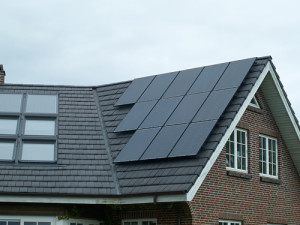 The biggest challenge to solar energy is the inability to both capture it and store it in any meaningful way. In fact, while efficiency in capturing solar power has increased from about 15 percent of most solar panel models to 35 percent efficiency in the higher ends, even when captured the energy grid is unable to store and regulate its flow throughout the day.
The biggest challenge to solar energy is the inability to both capture it and store it in any meaningful way. In fact, while efficiency in capturing solar power has increased from about 15 percent of most solar panel models to 35 percent efficiency in the higher ends, even when captured the energy grid is unable to store and regulate its flow throughout the day.
Enter the Tesla Powerwall
Elon Musk, CEO of electric carmaker Tesla Motors, announced earlier this year that Tesla's new Powerwall for the home and Powerpack for commercial use already garnered 38,000 preorders. The Tesla Powerwall offers 92 percent efficiency in DC round-trip power.
Here are the basics:
The Powerwall home battery charges via electricity generated by solar panels. As solar energy wanes throughout the evening or on a cloudy day, the battery supplies energy back to your home instead of pushing it into the public power grid. The Powerwall also offers energy during a power outage, so homeowners in storm-prone areas or country homes with unreliable utility service can access emergency power.
The Powerwall utilizes a lithium ion battery with technology similar to that in Tesla automobiles and installs on the wall of your garage, basement or even outdoors. For larger homes, or those with higher power consumption requirements, multiple batteries can be installed together with up to 90 kWh total available power. Each battery in its weather resistant enclosure is just 51.2 inches by 33.9 inches and only 7.1 inches deep.
The system uses rooftop solar panels connected to the Powerwall and an inverter that directs current from both the solar panels and the Powerwall battery into your home's alternating current power system.
For an example of how much energy your home uses in the day, consider that your refrigerator consumption is commonly 4.8 kWh/day (kilowatt hour per day) while your washer and dryer together equal about 5.6 kWh/day. Add to that your lights, laptop, flat screen television or stereo and you're looking at about 2.5 kWh/day additional consumption.
Of course, the first question that comes to mind for a cutting –edge home technology like this is the cost. According to Tesla Motors specifications, the home-sized batteries cost just $3000 for the 7-kWh model and $3500 for the 10-kWh version. Each comes with a 10-year warranty.
If you're looking for an energy efficient home that conforms to the requirements for solar panels, let your real estate professional know. We can optimize your search so that you find the home that is just right for you and your power needs.
Compliments of Virtual Results